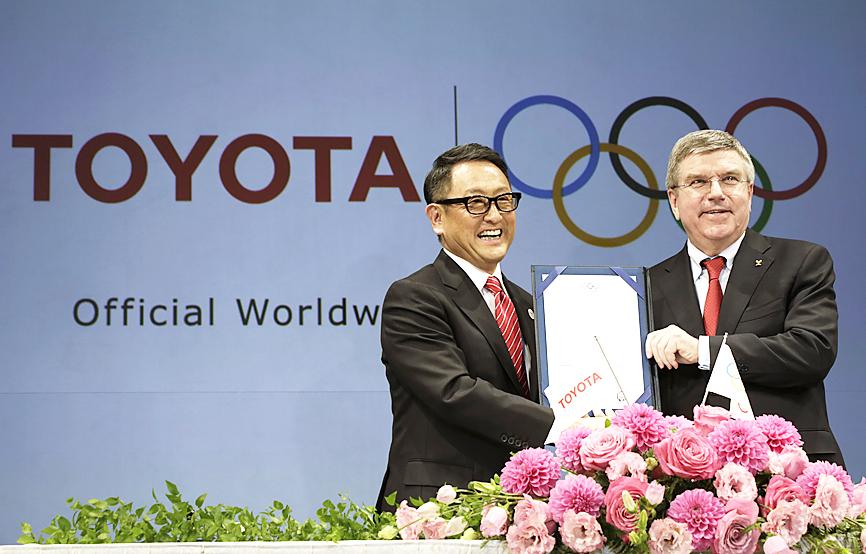Toyota Motor Corp would not be airing any Olympic-themed advertisements on Japanese television during the Tokyo Games despite being one of the International Olympic Committee’s (IOC) top corporate sponsors.
The extraordinary decision by the country’s top automaker underlines how polarizing the Games have become in Japan as COVID-19 infections rise ahead of Friday’s opening ceremony.
“There are many issues with these Games that are proving difficult to be understood,” Toyota chief communications officer Jun Nagata told reporters yesterday.

Photo: AP
Chief executive Akio Toyoda, the company founder’s grandson, would be skipping the opening ceremony. That is despite about 200 athletes taking part in the Olympics and Paralympics who are affiliated with Toyota, including swimmer Takeshi Kawamoto and softball player Miu Goto.
Nagata said the company would continue to support its athletes.
Being a corporate sponsor for the Olympics is usually all about using the games as a platform to enhance the brand, but being linked with a pandemic-era Games might be viewed by some as a potential marketing problem.
Toyota signed on as a worldwide Olympic sponsor in 2015, in an eight-year deal reportedly worth nearly US$1 billion, becoming the first auto company to join the IOC’s top-tier marketing program.
The sponsorship, which started globally in 2017, runs through the 2024 Olympics, covering three consecutive Olympics in Asia, including the Tokyo Games.
The Tokyo Olympics, already delayed by a year, are going ahead despite the Japanese capital being under a state of emergency.
It is already virtually a made-for-TV Olympics with most events, including the opening ceremony, going ahead without fans in the venues. Some dignitaries, such as IOC president Thomas Bach and Japanese Emperor Naruhito, are likely to attend.
Toyota is one of the most trusted brands in Japan. The maker of the Prius hybrid and Lexus luxury models prides itself on its quality controls, with its “just in time” super-efficient production methods praised and emulated around the world.
Public opinion surveys reflect widespread concern among Japanese people about having tens of thousands of Olympic participants enter the country during a pandemic.
Motoyuki Niitsuma, a manufacturing plant worker who was banging on a bucket in a recent Tokyo protest against the Olympics, said he did not like the idea of cheering for the national team, and the pandemic has made that message clear.
“The time to compete is over. Now is the time to cooperate,” he said. “We should never have gotten the Games.”

South Korea’s equity benchmark yesterday crossed a new milestone just a month after surpassing the once-unthinkable 5,000 mark as surging global memory demand powers the country’s biggest chipmakers. The KOSPI advanced as much as 2.6 percent to a record 6,123, with Samsung Electronics Co and SK Hynix Inc each gaining more than 2 percent. With the benchmark now up 45 percent this year, South Korea’s stock market capitalization has also moved past France’s, following last month’s overtaking of Germany’s. Long overlooked by foreign funds, despite being undervalued, South Korean stocks have now emerged as clear winners in the global market. The so-called “artificial intelligence

NEW IDENTITY: Known for its software, India has expanded into hardware, with its semiconductor industry growing from US$38bn in 2023 to US$45bn to US$50bn India on Saturday inaugurated its first semiconductor assembly and test facility, a milestone in the government’s push to reduce dependence on foreign chipmakers and stake a claim in a sector dominated by China. Indian Prime Minister Narendra Modi opened US firm Micron Technology Inc’s semiconductor assembly, test and packaging unit in his home state of Gujarat, hailing the “dawn of a new era” for India’s technology ambitions. “When young Indians look back in the future, they will see this decade as the turning point in our tech future,” Modi told the event, which was broadcast on his YouTube channel. The plant would convert

‘SEISMIC SHIFT’: The researcher forecast there would be about 1.1 billion mobile shipments this year, down from 1.26 billion the prior year and erasing years of gains The global smartphone market is expected to contract 12.9 percent this year due to the unprecedented memorychip shortage, marking “a crisis like no other,” researcher International Data Corp (IDC) said. The new forecast, a dramatic revision down from earlier estimates, gives the latest accounting of the ongoing memory crunch that is affecting every corner of the electronics industry. The demand for advanced memory to power artificial intelligence (AI) tasks has drained global supply until well into next year and jeopardizes the business model of many smartphone makers. IDC forecast about 1.1 billion mobile shipments this year, down from 1.26 billion the prior

People stand in a Pokemon store in Tokyo on Thursday. One of the world highest-grossing franchises is celebrated its 30th anniversary yesterday.